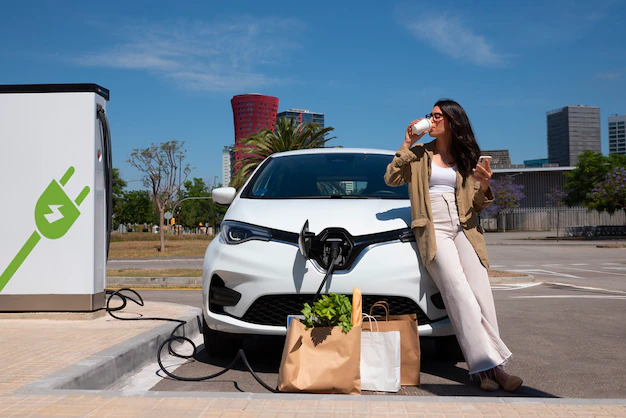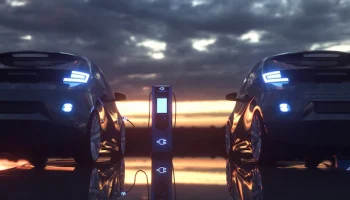As the world confronts the escalating challenges of climate change and environmental degradation, the shift towards electric vehicles (EVs) represents a beacon of sustainable innovation. This transition not only heralds a new era of transportation but also promises substantial environmental benefits.
In this exploration, we’ll delve into how embracing EVs can significantly improve air quality, reduce greenhouse gas emissions, and contribute to a greener planet.
Understanding Electric Vehicles
What are Electric Vehicles?
Electric vehicles, characterized by their use of electric motors powered by rechargeable batteries, mark a paradigm shift from traditional internal combustion engine vehicles. They have evolved from early prototypes to cutting-edge models, offering an efficient and cleaner alternative to gasoline-powered vehicles.
Types of Electric Vehicles
The realm of EVs includes Battery Electric Vehicles (BEVs) that run exclusively on electricity and Hybrid Electric Vehicles (HEVs) that combine electric propulsion with conventional engines. Unlike their gasoline counterparts, EVs release no tailpipe emissions, significantly mitigating environmental pollution.
What Are The Advantages Of EVs?
There are not one but many advantages of the electric vehicles. This is why these vehicles stay at the buyers’ top priority. Let us discuss them in this section.
Operating Cost Is Low
One of the advantages of electric vehicles is that they can charge batteries. Different studies suggest that the Hyundai Kona covers a massive 450 km on one single charge. Thus, the cost of operation of vehicles becomes low compared to the gasoline vehicle.
Low Maintenance costs
Unlike internal combustion cars, EVs do not contain different moving components. As a result, there are lower requirements for taking the EVs to the service station.
Unlike traditional vehicles composed of critical engine parts, the EVs are not that complex. This is why there is low maintenance compared to the general parts. The concept is simple: the more machine parts, the more they will have issues and, subsequently, the more you require to manage them. This is where the EVs have a clear advantage against the traditional vehicles.
Zero Emission
Emission-related problems jostle the entire world. Different nations have their strategy to attain Net Zero planning. One of the pathways to achieve it is using the EVs. These vehicles do not emit harmful greenhouse gases. Ultimately, it helps curb emissions significantly.
Reduction Of Noise
Noise pollution is another burning issue in the present day. These new vehicles help to reduce noise pollution. The electric vehicles operate silently. The manufacturers integrate the false sound for awarding the pedestrians.
Tax Benefits
We all know that EVs’ are quite cost-intensive. This is why common people find it extremely difficult to have them extremely difficult to have them. Keeping this cost intensiveness in mind, different states in the USA and Europe have framed policies on tax benefits. The EV owners enjoy lower tax and registration fees. These government incentives help the buyers have these vehicles and contribute to a cleaner and greener environment.
Convenience In Driving
As per the experience of the drives, the EVs are much more convenient to drive compared to the petrol cars. There is no involvement in using the brakes, accelerators, and steering wheels. All that you have to do is press the pedal or a set of buttons. It increases and lowers the speed.
Easy To Charge At Home
Time is important for everyone. You have to cut down your time and at the same time, from your schedule and reach the pumping station for gasoline. It is sure to cut down your time for sure.
These vehicles are easy to charge. If you forget to charge your EVs, then you can plug in and make your home the charging facility. Hence, there is no need to delay and reach the pumping destinations.
Environmental Impacts Of Traditional Vehicles
Emission Concerns
Conventional vehicles emit a range of greenhouse gases, notably carbon dioxide, contributing to global warming and climate change. They are also a major source of pollutants such as nitrogen oxides and particulate matter, which severely impact air quality and pose health risks.
Resource Consumption and Efficiency
Traditional vehicles heavily depend on finite fossil fuels. In contrast, EVs are more energy-efficient, converting a higher percentage of electrical energy into power through DC fast chargers, leading to less energy waste and a smaller carbon footprint.
Positive Environmental Effects Of EVs

Reduced Greenhouse Gas Emissions
EVs are a key player in reducing greenhouse gas emissions. A recent study from the Yale School of the Environment demonstrates that EVs, even when factoring in indirect emissions from their production and electricity generation, have a significantly lower environmental impact compared to fossil fuel vehicles. This reduction is critical in curbing climate change and achieving global carbon reduction targets.
Improving Air Quality
The transition to EVs is also a boon for urban air quality. According to research conducted by Northwestern University, EVs have a positive impact on air quality, even when their electricity is derived from combustion sources. By replacing combustion vehicles with EVs, we can significantly reduce pollutants like ozone and particulate matter, which are harmful to human health.
Related: The Future Of Electric Vehicles Around The World
Challenges And Solutions In EV Transition
Current Challenges in Adopting EVs
The path to widespread EV adoption is not without challenges. Key issues include developing extensive charging infrastructure, improving battery technology, and addressing higher initial costs compared to traditional vehicles.
Overcoming the Obstacles
Strides in battery technology, increasing the availability of charging stations, and government incentives are making EVs more accessible and cost-effective. Progressive policies and investments in EV infrastructure are essential to accelerate this transition.
The Future Of Transportation: A Greener Outlook
Advancements in EV Technology
Future technological advancements promise to enhance the environmental benefits of EVs. Innovations are expected in battery efficiency, charging technology, and integration with renewable energy sources.
The Role of Society and Policy
The widespread adoption of EVs also hinges on societal acceptance and supportive policies. Public awareness campaigns, incentives for EV purchasers, and investments in renewable energy infrastructure are critical for a comprehensive shift to electric transportation.
Conclusion
The transition to electric vehicles is a pivotal step towards a sustainable future. It presents an opportunity to significantly mitigate environmental impacts, particularly in terms of air quality and greenhouse gas emissions. Embracing EVs and supporting the necessary infrastructure and policies will be instrumental in steering our world towards a cleaner, greener future.
Read Also:




























